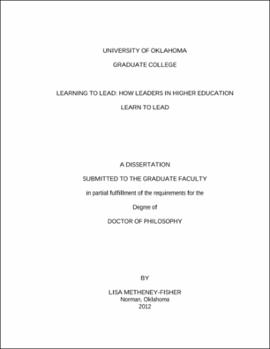| dc.contributor.advisor | Sharp, Susan | |
| dc.creator | Metheney-Fisher, Lisa | |
| dc.date.accessioned | 2019-04-27T21:28:13Z | |
| dc.date.available | 2019-04-27T21:28:13Z | |
| dc.date.issued | 2012 | |
| dc.identifier | 99217405602042 | |
| dc.identifier.uri | https://hdl.handle.net/11244/318763 | |
| dc.description.abstract | Learning leadership in higher education has historically not been a structured process. The purpose of this research is to understand how leaders in higher education learn to lead and the influence experience, professional development; mentoring and critical incidents play in the learning process. In this research both formal and informal approaches were found to be influential in learning through experience, mentoring and professional development. The information in this research will provide a platform for creating, fostering and developing future leaders in higher education. | |
| dc.description.abstract | The research questions addressed by this research include how significant experience, professional development, mentors and critical incidents has been in how leaders learn. It explores the degree to which learning to lead in higher education is derived from experience, the impact of professional development and the influence of mentoring learning to be leaders in higher education. | |
| dc.description.abstract | The methodology for this research included both quantitative and qualitative to include surveys that were sent to 350 leaders in higher education at tier two comprehensive level institutions within the Southern Regional Education Board (SREB). From the 118 surveys completed twenty leaders volunteered to participate in a one-hour interview. Findings from this research suggest most leadership is learned through experience and mentoring. For both of these areas, it is important for the leader to have the ability to reflect on situations and understand how to apply the learning to their leadership. Implications from this study would benefit higher education institutions, professional associations/organizations and future leaders in knowing and understanding how leaders learn and develop leadership programs based on this information. | |
| dc.format.extent | 118 pages | |
| dc.format.medium | application.pdf | |
| dc.language | en_US | |
| dc.relation.requires | Adobe Acrobat Reader | |
| dc.subject | Educational leadership | |
| dc.subject | College administrators--Training of--Southern States | |
| dc.title | Learning to Lead: How Leaders in Higher Education Learn to Lead | |
| dc.type | text | |
| dc.type | document | |
| dc.thesis.degree | Ph.D. | |
| ou.group | Graduate College | |
